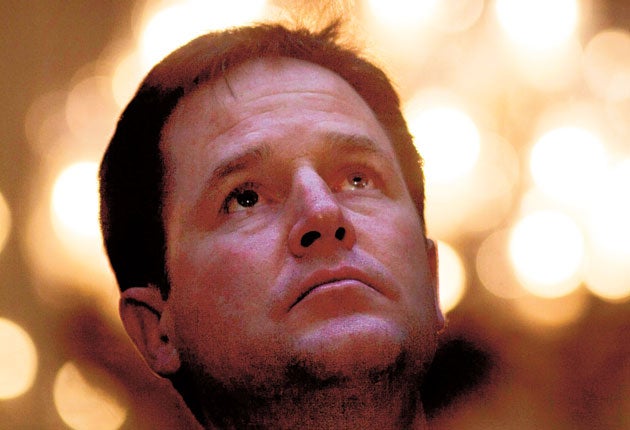Andrew Grice: The week that taught the Coalition the reality of being in power
Inside Politics

Although he had a busy schedule in China and South Korea, David Cameron had to devote more time than he had bargained for to events back home.
On Wednesday, an increasingly anxious Prime Minister watched the student riots outside Conservative Party headquarters in Millbank on his hotel television in Korea. He spoke to Theresa May, the Home Secretary, by phone as the dramatic events unfolded.
The riots also posed a headache for Nick Clegg. Standing in for Mr Cameron at Prime Minister's Questions, he had just been given an uncomfortable time by Harriet Harman over his spectacular U-turn on university tuition fees. However much the public disliked the violence, Liberal Democrat MPs rolled their eyes in horror, knowing the protest would draw more attention to their lurch from pledging to abolish fees to virtually trebling them. A Tory minister smiled: "Thank goodness our policy is being fronted by Vince Cable" [the Liberal Democrat Business Secretary]. You bet.
Six months into their coalition, both Mr Cameron and Mr Clegg have realised this week that power is a messy business. Welcome to government.
At the outset, they knew that Harold Macmillan's rule – "events, dear boy, events" – would conspire against them at some point. What's surprising is that the Coalition has not been blown off course more often. For the most part, it has been professional, disciplined and united, perhaps even more so than a single-party government because everyone works overtime to avoid Tory-Liberal Democrat disputes.
Inevitably, some Liberal Democrat MPs fear for their survival as the fees rise and spending cuts loom into view. The worriers are not entirely reassured by presentations by Team Clegg at their private meetings, showing different stages in the Coalition's five-year life cycle. The message is: what matters now is unity and strength. Carving out a distinctive identity for the party comes later.
Similarly, some Conservative backbenchers grumble that the Liberal Democrat tail wags the Tory dog. There's some whining about a lack of "grip" in Downing Street and (yuk) a "narrative" on what the Government is trying to achieve. Some critics are gunning for Ed Llewellyn, Mr Cameron's self-effacing chief of staff and a friend from his Eton, Oxford and Conservative Research Department days.
They want a bruiser like Leo McGarry, the White House chief of staff in TV's The West Wing, to knock heads together and ensure everyone sticks to the same script. They complain that George Osborne gets sucked into fire-fighting duties too often. The Chancellor has a day job, after all.
Mr Cameron is having none of it. He is loyal to his friends and believes Mr Llewellyn is an unsung hero. His diplomatic skills were honed while working for Chris Patten in Hong Kong and Paddy Ashdown in Bosnia (which may have something to do with the sniping). The PM believes Mr Llewellyn has proved himself uniquely qualified for his post – for example, by defusing Tory rows over Europe and navigating the minefield of this week's visit to China. He is also a pivotal link man with the Liberal Democrats and a general troubleshooter. "People see the balls you drop in government; they don't see the ones you catch. Ed Llewellyn catches a lot of them," said one No 10 insider.
One ball that was dropped was the appointment of Andrew Parsons as the PM's official photographer on the civil service payroll. He was previously employed by the Tory party. As it happens, he will work across government, but the label of "vanity photographer" will stick, just like the allegedly airbrushed NHS poster of Mr Cameron and the image of his chauffeur-driven car following behind as he cycled to Westminster.
If Mr Parsons and other former Tory staffers had been recruited soon after the May election, there wouldn't have been much fuss. Downing Street is convinced that Whitehall departments waste money by duplicating tasks such as photography, films and using the internet – either by employing staff directly or hiring outsiders for specific jobs. They predict that taking on a small number of people at the centre will save a lot of money. I predict that when that is proven, it will be virtually ignored by the media. Welcome to government again.
Another image that may stick is the massed ranks of Tory MPs cheering Mr Osborne to the rafters when he announced his spending review last month. They were admiring a skilful political performance but it looked as if they were salivating about the cuts. If Labour has any sense, it will include this footage in its election broadcasts next time. The picture suggests the Conservatives have an ideological purpose, which could be their Achilles heel, if voters think they are still the "same old Tories". Nor will it help the Liberal Democrats convince people that the Coalition has a core purpose beyond the cuts.
This week Mr Clegg insisted the mission statement is political, social and economic reform. "If you thought this Government was all about cuts, think again," he said.
The problem for him and Mr Cameron is that the Government's reforms on welfare, health and education are doomed to be seen through the prism of the cuts. The students' protest only heightens the impression and it will not be the last.
Join our commenting forum
Join thought-provoking conversations, follow other Independent readers and see their replies
Comments